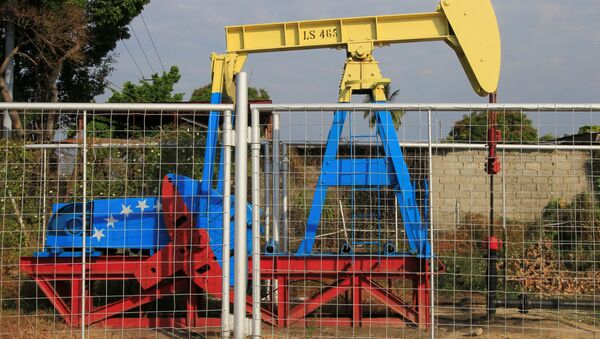New Delhi (Sputnik) — During a meeting between US Secretary of State Michael Pompeo and Indian Foreign Secretary Vijay Gokhale on Monday in Washington, the former emphasised that India should avoid becoming the "economic lifeline" to the "authoritarian" government of Venezuelan President Nicolas Maduro by purchasing oil from the Latin American country.
Other senior officials of the Trump administration, including National Security Adviser John Bolton, echoed the sentiment. However, India has been consistent in its approach of relying solely on domestic consultations on the question of continuing trade with Venezuela, seemingly siding with Russia and China on the ongoing political crisis in Venezuela.
Sputnik sought the view of energy specialist Dr Ravi Singh, research head at the Karvy Group, India's leading financial services firm, on the matter.
READ MORE: IndianOil Examining Upstream Opportunities in Russia Amid Sanctions — Chairman
Sputnik: Should India toe the line of the US, which has declared financial sanctions against Venezuela? How is India going to be impacted by the US sanctions on Venezuela?
The US sanctions may provide Nayara Energy and Reliance with an opportunity to get extra Venezuelan crude as more of it becomes available in the market that is redirected from the US, which will help make up for supply lost. However, it's too early to determine how much more Venezuelan oil may come to India.
READ MORE: US to Impose ‘Significant’ Sanctions on Venezuela in Coming Days — Abrams
Sputnik: There have been speculations in India about private firms cutting imports of Venezuelan oil. Can the government dictate to the private firms to continue purchasing from Venezuela?
Dr Ravi Singh: Both Reliance and Nayara have a big appetite for Venezuelan crude given their heavy crude slate. They cut imports recently due to declining production in Venezuela and Mexico. That's because their advanced refining systems can process the thick Venezuelan grade into high-value fuels such as low-sulphur gasoline and jet fuel. In contrast, state-owned refiners generally won't benefit from more Venezuelan crude as their facilities can't handle the low quality.
Dr Ravi Singh: The US has permitted India and seven other countries to import a limited quantity of Iranian oil under a six-month sanctions waiver, which India hopes will be extended. India is seeking to diversify its oil import sources amid tough US sanctions on Iran and Venezuela and maintains that "commercial considerations and related factors" will determine the value of its trade with any country, including Venezuela which currently holds the rotating chair of OPEC. In its latest report, India's Oil Ministry's Petroleum Planning & Analysis Cell said crude oil imports costs are estimated to increase by 27% to $112 billion in the current fiscal year that will end in March, from a year ago. In the past, whenever there were disturbances in Iraq and Kuwait, India's oil supplies were in very bad shape and it doesn't want to face that kind of situation again.
The views expressed in this article are solely those of the speaker and do not necessarily reflect the official position of Sputnik.





